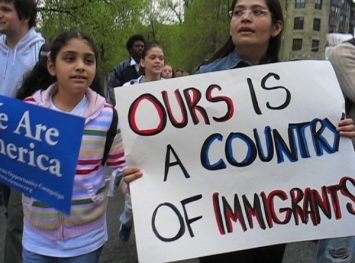
By Daniela Torres
Photo via Wikipedia, public domain image
June 5, 2023 (Washington D.C.) -- Representatives María Elvira Salazar of Florida and Veronica Escobar of Texas have proposed a bipartisan immigration bill, the Dignity Act of 2023. If enacted, it would provide immigrants with a path to citizenship, while also strengthening border security and phasing in e-verify requirements for employers.
Salazar, a Republican, has been working on the bill alongside Escobar, a Democrat, since December of 2022 before introducing HR 3599 in late May. View a summary of the bill on Salazar’s site.
The original cosponsors of the bill include Reps. Jenniffer Gonzalez-Colon (R-PR), Hillary Scholten (D-MI), Lori Chavez-DeRemer (R-OR), Kathy Manning (D-NC), Mike Lawler (R-NY), and Adriano Espaillat (D-NY).
The bill addresses 4 core principals: “(1) stopping illegal immigration; (2) providing a dignified solution for undocumented immigrants living in America; (3) strengthening the American workforce and economy; and (4) ensuring the United States remain prosperous and competitive in the future.”
The bill would provide $25 billion to protect the border. The funding would go towards increasing border patrol personnel, enhanced physical barriers, and newer technology to keep people from illegally crossing.
In addition, Operation Stonegarden would be funded under the bill and would provide funds to “state, county, tribal, and other entities near the border to help enhance border security.” The border must first be declared as secured before anyone is given the opportunity to gain legal status.
Undocumented individuals could be granted legal status under the Dignity Program by meeting these requirements:
● The individual must have resided in the US for at least 5 years,
● pay a $5000 fee over the course of 7 years (the duration of the program),
● pass a criminal background test,
● Pay any outstanding taxes, and
● Begin or continue paying taxes.
A streamlined procedure would be available for those granted temporary protection through the Deferred Action for Childhood Arrival program, waiving fees for many DACA recipients.
The measure would allow previously undocumented workers to work and travel anywhere freely. However, 1.5% would be levied from their income and deposited into the immigration infrastructure fund. US taxpayer funds will not go towards the Dignity Act.
The Redemption Program is a secondary five-year program following the Dignity Program, which would allow applicants to be potentially eligible for citizenship. Applicants must learn English and U.S. civics, as well as contribute to their community or pay an additional $5,000 in restitution.
As for asylum seekers, processing time would be sped up to 60 days - with the initial screening being made within the first 15 days and the second one being made between days 15-60. Currently, some applicants have been waiting for years.
The bill would also authorize humanitarian campuses in which migrants can “meet with legal counsel, be interviewed by officials to discuss their asylum claim, and have their case determined by asylum officers.”
Regional processing centers would be established in areas across Latin America where individuals would be pre-screened for asylum eligibility.
The bipartisan bill is bound to induce conflicts and opposition from some in both Republican and Democratic parties, but it can be seen as a courageous step forward in introducing a possible solution for the decades-long issue of immigration








Comments
this is a good start